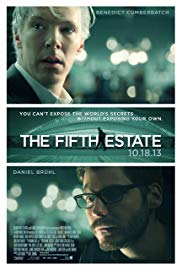
One would think that the group that turned modern-day journalism on its ear would have a much more interesting story to tell, or at least a more original story, than the one that drives “The Fifth Estate.” As it is, we have the age-old morality play about the man who sets out to bring justice to the oppressed but is ultimately undone by his own ego, played out by people on laptops. (Hollywood has tried again and again to make hacking look sexy. It’s not.) This is not to say that “The Fifth Estate” is dull, because it’s teeming with interesting bits and the possibilities for more. The problem is the execution, both from a story structure standpoint and a directorial standpoint. You will be hard pressed to find a movie this year as overly directed as this one.
IT guru Daniel Berg (Daniel Brühl) meets Julian Assange (Benedict Cumberbatch) at a tech conference. Assange has created a site that guarantees anonymity for whistle blowers with the intent of bringing large-scale wrongdoers to justice, and he recruits Daniel to help him get the message out. Their site WikiLeaks quickly finds an audience, but Assange grows resentful of Berg getting an ounce of credit for the site’s success, while Berg’s girlfriend grows resentful of her widow status as Assange calls on Berg at all hours of the day and night. Things come to a head when Assange plans on releasing a bunch of top secret US government files without redacting the names of informants in the field. Assange views redaction as bias. Berg views it as responsible journalism.
One question repeatedly sprang to mind while watching this movie: where did the money come from? We see multiple shots of Assange and Berg globetrotting for what seems like years before the subject of donations to WikiLeaks is even mentioned, meanwhile neither has a day job and Assange and Berg talk of how strapped for cash they are to increase their server space once they realize that demand is greater than their bandwidth can supply. If they’re both so broke, how were they able to travel the world seemingly at will?
For a story with as much built-in suspense – which it occasionally executes, but not as often as it should – “The Fifth Estate” is not nearly as engaging as it should be, and that is because of the lack of character development. Assange might be as vain as he is portrayed here – the best bit in the movie is when they have Cumberbatch respond to the statement cards just before the credits, and he lets it all hang out – but there are surely shades of humility to him as well, yet we do not see them. Rather, we see a man whose entire personality is an unholy blend of blind arrogance and bull-like stubbornness, with a healthy dose of social inadequacy tossed in for good measure. Even if that is exactly what he’s like, it feels like a stereotype on film. Not all of this is Cumberbatch’s fault, mind you, though he doesn’t help matters by waffling with the Australian accent. On the flip side, Brühl plays Berg like the journalistic equivalent of Ewan MacGregor in the “Star Wars” prequels, beard and all: noble, but bland. The movie clearly wants to be like “The Social Network,” but the script refuses to make the hard choices when it comes to humanizing, never mind developing, the characters.
And then there’s Bill Condon’s direction, which is needlessly flashy and graphic-laden. He directed this movie within an inch of its life, where the opposite approach may have worked better. The studio must have thought they were making the next “All the President’s Men,” right? Then make the next “All the President’s Men,” not the next “Hackers.”
“The Fifth Estate” does flesh out the cast with some dynamic actors in small roles, namely Laura Linney, Stanley Tucci, David Thewlis and Peter Capaldi. Sadly, none of them has enough to work with to take their part of the movie to the next level. Still, they have more than the leads, which is pretty damning when you think about it. Julian Assange has to be more complicated than this. The movie about his life should be as well.
 (2.5 / 5)
(2.5 / 5)



